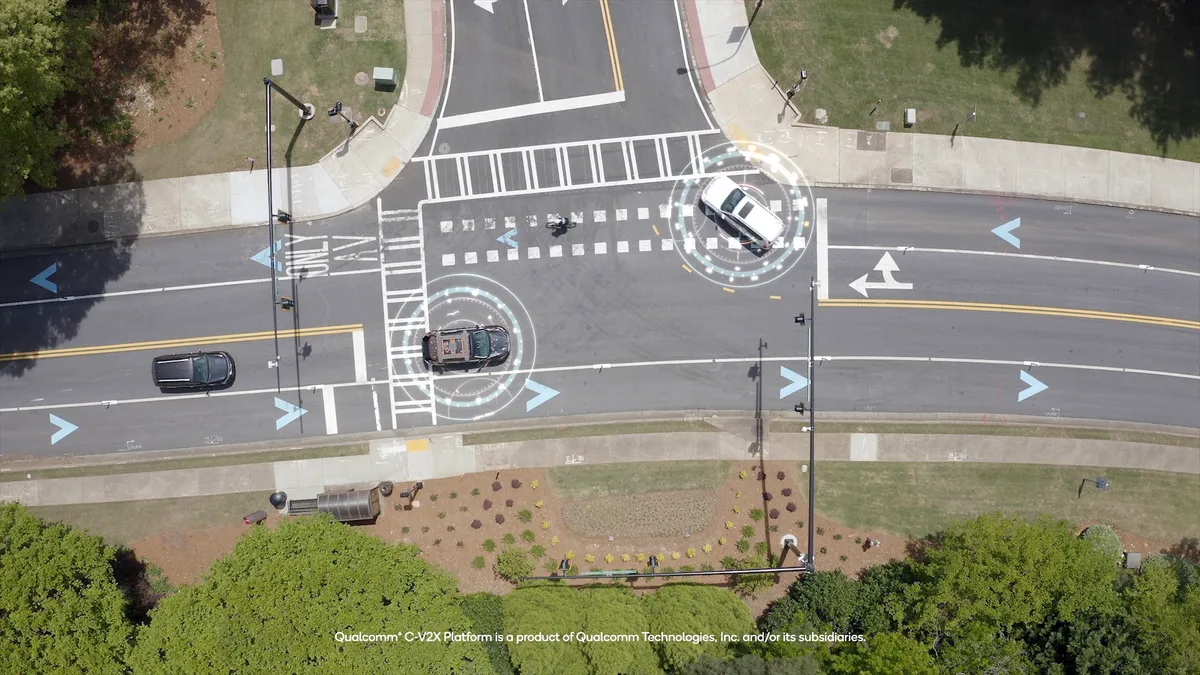Dive Brief:
- The City of Peachtree Corners, Georgia, announced Wednesday it will deploy the traffic management Cellular Vehicle-to-Everything (C-V2X) technology in partnership with Qualcomm and infrastructure firm Jacobs.
- The Atlanta suburb, through its Curiosity Lab smart city living laboratory, will deploy the C-V2X technology on roadside units, intersections and on two of the vehicles in the city’s fleet. Its fire trucks and ambulances already have C-V2X capabilities, said Brandon Branham, assistant city manager and chief technology officer, and Peachtree Corners hopes to expand that deployment to all 350 of its fleet vehicles soon.
- The technology will be used to improve travel times and efficiency, including through real-time adjustments of signals to improve traffic flow, Branham said during a briefing with reporters.It could also help improve safety, he said, especially where the city's network of multiuse trails intersect with streets.
Dive Insight:
Peachtree Corners has looked to be at the forefront of smart city projects with Curiosity Lab, which opened in 2019 in a 500-acre commercial office park and includes a 1.5-mile autonomous vehicle test track. Since then, it has added an incubator program that will support developers as they build and test new 5G technology use cases. It's also experimenting with a variety of other technologies, including a teleoperated dockless scooter fleet in partnership with Tortoise and Go X.
Efforts to improve road safety come at a vital time, with experts like the National Safety Council and the Governors Highway Safety Administration seeing dramatic increases in vehicle-related and pedestrian fatalities even as driving saw a drop last year during the worst of the coronavirus pandemic. Meanwhile, Peachtree Corners is battling with road congestion as part of the Metropolitan Atlanta area. Branham said 65,000 cars a day travel through one of its main corridors to go downtown, so finding ways to help cars move smoothly and not get bogged down on its streets is critical.
"We see from a city perspective, our job is to make our residents' and employees' lives better, and the Metro Atlanta traffic is one of the biggest headaches we face every day," he said.
Nationally, transportation analytics company INRIX said poorly timed signals mean U.S. drivers experience a collective 17.25 million hours of delays per day at intersections. C-V2X technology means those signals can be adjusted in real time based on demand and congestion, and also be adjusted to help first responders move around quicker in an emergency.
"We see this as an investment in both here and now, and also for the future of our city," Branham said.
This new technology deployment comes with Peachtree Corners looking to expand its autonomous shuttle route in the fall. Branham said it will again start in the office park after its pilot program saw "great participation," with a view to connecting to its downtown. With a variety of other transportation modes being tested and deployed in the city, managing those competing demands will be a challenge, Branham said.
"At the end of the day, this technology is about safety, it's about saving lives," he said. "Once you start incorporating all these different players into this box here, you can start to really test things out."
Partners on the project hope Peachtree Corners' efforts can inspire others to do similar work. Ford has pledged to deploy C-V2X technology in all of its new vehicles starting next year, while automakers regularly showcase new technological developments. Sanjeet Pandit, Qualcomm's senior director of business development and global head of smart cities, said he hopes this deployment can be a "catalyst towards adoption of this technology in other cities."












